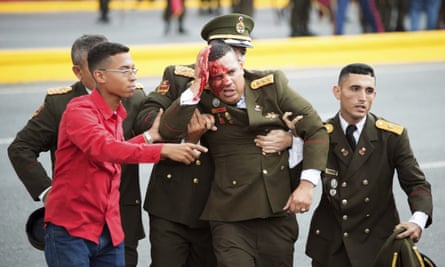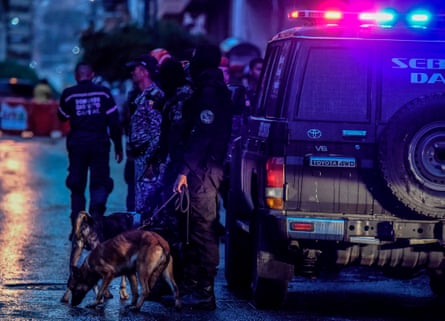Venezuela’s president, Nicolás Maduro, has survived an apparent assassination attempt after what officials described as drones armed with explosives detonated overhead during a speech he was making at a military event.
The drones were flown towards Maduro as he addressed soldiers in Caracas on Saturday, officials said.
Mid-speech, Maduro and his wife, Cilia Flores, looked up at the sky and winced after hearing the sound of an explosion. The drones did not reach him, officials said, but it was not clear if they were shot down or exploded prematurely. Seven people were injured, the country’s information minister, Jorge Rodríguez, said.
“The investigation clearly reveals [the explosions] came from drone-like devices that carried explosives,” he said.

Some in Venezuela, however, are questioning the government’s version of events. Firefighters say the incident was caused by a gas tank explosion in a nearby apartment, according to the Associated Press.
Some local journalists have backed up the claim, posting photos on Twitter of smoke billowing from the Residancias Don Eduardo apartment building on the street where the apparent attack took place.
Rocío San Miguel, a military expert and the head of Control Ciudadano, an investigative website focused on security, said that at least one drone belonged to the military, who lost control of the device inflight. Soldiers then shot it down. The nearby building explosion was coincidental, he said.
Speaking from the presidential palace two hours after the attack, Maduro announced that those behind the attempt on his life had been captured. He suggested an initial investigation showed Colombia and the US state of Florida, where many Venezuelan exiles live, were linked to the explosions.
“I am alive and victorious,” the socialist president said in a bellicose televised address. “Everything points to the Venezuelan ultra-right in alliance with the Colombian ultra-right, and that the name of Juan Manuel Santos is behind this attack.”
A spokesperson for the Colombian president, who leaves office on Tuesday, quickly denied the allegations. “The president is focused on the baptism of his granddaughter and not on bringing down foreign governments,” the official said.

The two presidents have often sparred, with Santos regularly labelling his Venezuelan counterpart a dictator and saying he is leading his country into economic and political turmoil.
No one has claimed responsibility for the alleged assassination attempt, though one group, Franelas Soldiers, suggested involvement in a tweet.
“We have shown [the government] is vulnerable,” the group, the identities of whose members are not known, said. “[The attack] wasn’t achieved today but it is just a matter of time [until it is].”
La operación era sobrevolar 2 drones cargados con C4 el objetivo el palco presidencial, francotiradores de la guardia de honor derribaron los drones antes de llegar al objetivo.
— Soldados de Franelas (@soldadoDfranela) August 4, 2018
Demostramos que son vulnerables, no se logró hoy pero es cuestión de tiempo. #MilitaresPatriotas pic.twitter.com/teIEwygN3S
The panic was captured in a live broadcast of the parade and speech, with Maduro and other officials looking to the sky from the podium while talking about the economy. Loud bangs were heard in the background. The audio then went out and the camera panned to scores of soldiers scattering from formation before the broadcast too was abruptly cut.
Carlos Julio Rojas lives one block from the Avenida Bolívar, the central highway where the parade was taking place. “I heard two explosions,” he said. “I felt the walls of my house tremble and saw the soldiers run to the other side [of the street].”
Rojas said the military presence around the city centre had been stepped up since the incident.
Another eyewitness, who asked not to be named, tried to film the chaos on his phone from outside the event’s picket barrier.
“I started recording with my phone what was happening around me … people running around … and a member of the national guard approached me, took my phone and deleted the video,” the man said.
Members of the media covering the event are said to have been detained, with one Associated Press photographer released hours after the chaos ensued, according to the website Crónica Uno.

“So far the drone attack is the best explanation we have, but it raises far more questions than answers,” said Geoff Ramsey, the assistant director for Venezuela at the Washington Office on Latin America.
Ramsey dismissed the notion that the attack was a “false flag”, saying it made the government look weak. “Staged or not, the end result will be the same. Maduro is certain to use this to justify further repression of the opposition, and to rally his ruling circle around a perceived enemy threat,” he said.
Opposition members have called for patience as investigations get going, while casting doubt on what they might reveal. “It’s very difficult to believe what the regime’s bureaucrats say,” a press release put out by the activist group Frente Amplio, or Broad Front, read.
Some Venezuela experts raised suspicions about what had actually happened on social media. “The official ‘investigation’ of today’s alleged assassination attempt against president Maduro takes the usual course: begin with the conclusions and work backwards,” Phil Gunson, a consultant with the non-profit Crisis Group, tweeted. “In a country where 98% of crime goes unpunished, government sleuths resolve this kind of case in a matter of hours.”

Venezuela, which has the largest proven oil reserves on the planet, has been in economic and political turmoil for several years, triggered by low oil prices. The International Monetary Fund predicts inflation will reach 1m% by the end of the year, and shortages in basic goods and medicines are widespread.
Maduro replaced the socialist Hugo Chávez after his death from cancer in 2013. The former bus driver has moved to stamp out dissent, with recent anti-government demonstrations leaving more than 100 people dead. In July last year, he sidelined the opposition-led Congress and installed a new body stacked with loyalists.
Quick GuideWhy is Venezuela in crisis?
Show
Under the late Hugo Chávez, who ushered in Venezuela’s socialist revolution in 1999, a new constitution and numerous elections placed nearly all government institutions under the control of the ruling Socialist party.
This concentration of power was aided by a feuding opposition which carried out ineffectual campaigns and electoral boycotts. After Chávez died of cancer in 2013, he was succeeded by Nicolás Maduro who is even less tolerant of dissent.
Growing political authoritarianism has coincided with greater state dominance over the economy. But expropriations, price controls and mismanagement have led to a 40% contraction of the economy in the past five years.
Oil accounts for 96% of Venezuela’s export income but many foreign companies have been driven out and production has dropped to a 30-year low.
The resulting fiscal crisis has prompted the government to print more money, which has led to hyperinflation and a collapse of the currency.
It also means that the government can’t import enough food and medicine to meet demand.
Maduro has rejected economic reforms out of loyalty to socialism and because many government officials are allegedly getting rich off the economic distortions – through exchange rate scams and by selling scarce food on the black market.
He won a new six-year term in May but his main rivals disavowed the election and alleged huge irregularities.
A rogue police officer, Óscar Pérez, hijacked a helicopter last year and fired at government buildings in what he said was an action against a dictator. Pérez was hunted down and killed by Venezuelan forces.
Associated Press and Reuters contributed to this report.